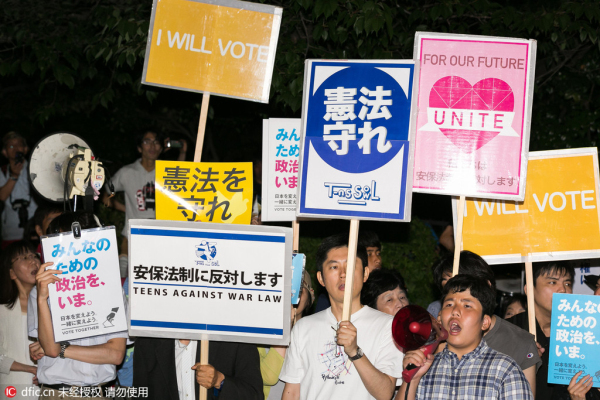 |
|
Members of T-ns SOWL hold placards to encourage young people to vote in the summer's House of Councillors elections outside the Parliament building on June 10, 2016, Tokyo, Japan. The Teens Stand up to Oppose War Law (T-ns SOWL) is a voluntary activist group of high school students whose goals are to protect democracy and pacifism in Japan. This year's House of Councillors elections is the first time that 18 and 19 year old can vote, and demonstration organizers claimed that 1500 attended the event.[Photo/IC] |
Japan lodged a?serious protest over Chinese warships sailing close to the Diaoyu Islands in the East China Sea last week, with the Japanese Vice Foreign Minister Akitaka Saiki reportedly summoning Cheng Yonghua, the Chinese ambassador to Tokyo, at midnight to "express serious concern". Beijing News commented on Wednesday:
Determined to revise Japan's Constitution to make the country "a normal state" again, Japanese Prime Minister Shinzo Abe is willing to go to great lengths to solicit public support at home, especially as the upper house election is drawing near.
Some Japanese opposition parties have made progress in thwarting Abe's long-held aspiration to revise the country's pacifist Constitution, and thousands of protesters gathered in downtown Tokyo earlier this month calling on Abe to resign and for a law allowing the military to fight overseas to be overturned.
Just a few days before the protest, Abe had announced a decision to delay a sales tax increase again by two-and-a-half years, which signals to many the failure of so-called Abenomics.
Smearing China over the Diaoyu Islands issue and playing the "China threat" card, to some extent, may help him dilute public discontent.
In essence, his true intention is to improve his administration's approval rate and enhance the Washington-Tokyo military alliance.
The United States has repeatedly claimed that the Diaoyu Islands fall within the scope of the US-Japan Treaty of Mutual Cooperation and Security, which explains why the Abe administration keeps stoking "anti-China" sentiments among the Japanese public and seeking to portray Japan as a victim of the postwar international order.

I’ve lived in China for quite a considerable time including my graduate school years, travelled and worked in a few cities and still choose my destination taking into consideration the density of smog or PM2.5 particulate matter in the region.